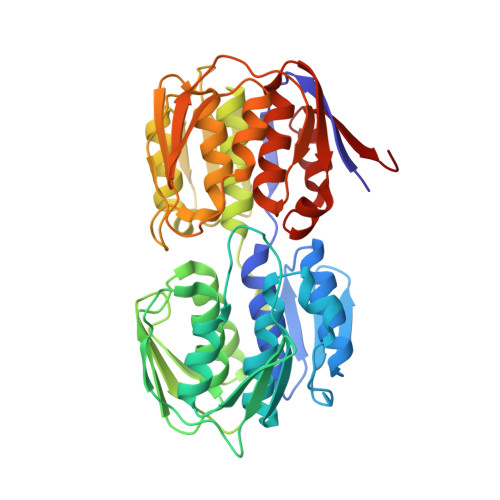The fungal product terreic acid is a covalent inhibitor of the bacterial cell wall biosynthetic enzyme UDP-N-acetylglucosamine 1-carboxyvinyltransferase (MurA) .
Han, H., Yang, Y., Olesen, S.H., Becker, A., Betzi, S., Schonbrunn, E.(2010) Biochemistry 49: 4276-4282
- PubMed: 20392080
- DOI: https://doi.org/10.1021/bi100365b
- Primary Citation of Related Structures:
3KQA, 3KR6, 3LTH - PubMed Abstract:
Terreic acid is a metabolite with antibiotic properties produced by the fungus Aspergillus terreus. We found that terreic acid is a covalent inhibitor of the bacterial cell wall biosynthetic enzyme MurA from Enterobacter cloacae and Escherichia coli in vitro. The crystal structure of the MurA dead-end complex with terreic acid revealed that the quinine ring is covalently attached to the thiol group of Cys115, the molecular target of the antibiotic fosfomycin. Kinetic characterization established that the inactivation requires the presence of substrate UNAG (UDP-N-acetylglucosamine), proceeding with an inactivation rate constant k(inact) of 130 M(-1) s(-1). Although the mechanisms of inactivation are similar, fosfomycin is approximately 50 times more potent than terreic acid, and the structural consequences of covalent modification by these two inhibitors are fundamentally different. The MurA-fosfomycin complex exists in the closed enzyme conformation, with the Cys115-fosfomycin adduct buried in the active site. In contrast, the dead-end complex with terreic acid is open, is free of UNAG, and has the Cys115-terreic acid adduct solvent-exposed. It appears that terreic acid reacts with Cys115 in the closed, binary state of the enzyme, but that the resulting Cys115-terreic acid adduct imposes steric clashes in the active site. As a consequence, the loop containing Cys115 rearranges, the enzyme opens, and UNAG is released. The differential kinetic and structural characteristics of MurA inactivation by terreic acid and fosfomycin reflect the importance of noncovalent binding potential, even for covalent inhibitors, in ensuring inactivation efficiency and specificity.
- Drug Discovery Department, H. Lee Moffitt Cancer Center and Research Institute, Tampa, Florida 33612, USA.
Organizational Affiliation:


















